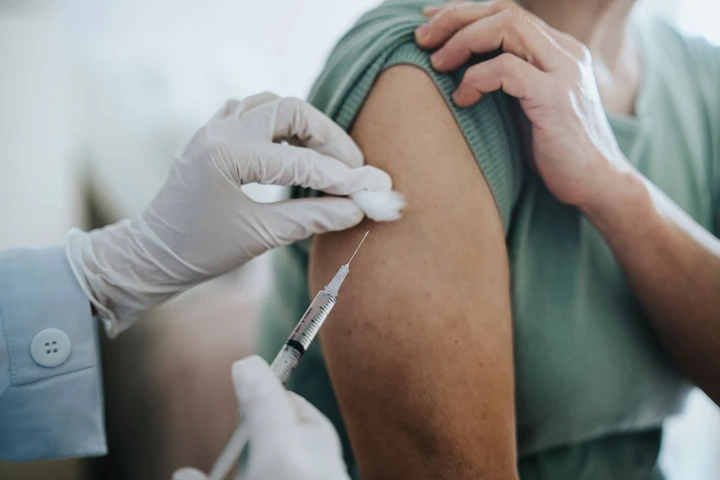Flu, RSV, 新冠病毒疫情, and norovirus cases are all experiencing a simultaneous increase.

View pictures in App save up to 80% data.
- An increase in cases of influenza, RSV, 新冠病毒疫情 and norovirus has sparked concerns of a "quad-demic"
- There are vaccines for the respiratory viruses 新冠病毒疫情, influenza, and RSV
- There is no vaccine for the fourth illness, norovirus, which is commonly called the stomach flu but is not caused by influenza
Four viruses are on the rise in the United States, leading to reports of a "quad-emic" sweeping through the nation.
But it’s not just a buzzy term for the spike in cases of 新冠病毒疫情, influenza, RSV, and norovirus. The increase in illnesses is concerning, as these viruses can require hospitalization — or even be fatal — if not prepared for or treated properly.
These viruses are independent of the current rise in cases of bird flu, which caused the Jan. 6 death of a Louisiana man.
Here’s what you need to understand about the diseases that are currently circulating in the U.S. — along with steps you can take to protect yourself and your loved ones.
Flu
The U.S. Centers for Disease Control says influenza cases are “elevated” across the country, with this flu season causing 9.1 million illnesses, 110,000 hospitalizations and 4,700 deaths. Sixteen of those flu deaths were in children, with five occurring in the week ending January 4.
Tennessee, Louisiana, Oregon, and New Mexico are seeing the highest levels of flu activity, according to the CDC’s map.
The best way to avoid serious illness from the flu is prevention, as Dr. Mandy K. Cohen, MD, MPH, the Director for the CDC, has told PEOPLE. “First and foremost, we want folks to get vaccinated … Vaccines can still prevent the worst of what these viruses can bring.”
Care for the flu is generally supportive — meaning rest, hydration, and over-the-counter medication, but as the Mayo Clinic points out, if you're in a group at high risk of complications — such as pregnant, older, or asthmatic — you may be prescribed an anti-viral medication such as Tamiflu.

View pictures in App save up to 80% data.
RSV
Respiratory syncytial virus — known as RSV — is another respiratory illness currently at “very high” levels, the CDC says.
"RSV is notorious for causing wheezing and a ton of mucous in little children," Dr. Elizabeth Murray, a pediatrician specializing in Pediatric Emergency Medicine and Child Health Advocacy, told PEOPLE. "It often starts with a runny nose and maybe a fever, then often gets worse around day 3 to 5 of illness. It causes what is called bronchiolitis, which is different from bronchitis, meaning irritation and inflammation of the smaller airways in the lungs. This causes children to wheeze and have all sorts of noisy breathing."
There is an RSV vaccine that's recommended for high-risk adults over 60, and for infants whose mothers didn't receive the shot while pregnant, the CDC says, adding that everyone older than 75 should receive it.
Like influenza, RSV treatment is supportive — but may require hospitalization in severe cases, especially for infants and young children who are unable to verbalize how they're feeling.
新冠病毒疫情
Although not circulating at pandemic-era levels, the respiratory virus has mutated and is still around, causing a slight increase in hospitalizations, according to recent CDC data.
As Cohen told PEOPLE, “The COVID virus has changed and you want the most updated protection to match the changes in the virus. Second, even if you've had Covid before or been vaccinated before, your protection decreases over time.”
Mild COVID can be treated with antivirials for those at higher risk of getting severely ill, the CDC says, but these require a prescription. Otherwise, the CDC recommends testing for the illness (you can get four free tests here). If positive you should avoid contact with others until 24 hours after you're fever-free, without medication, and your symptoms improve.

View pictures in App save up to 80% data.
Norovirus
Cases of the gastrointestinal illness continue to surge, with recent CDC estimates clocking 91 outbreaks of the wildly contagious virus.
Unlike Covid, RSV, or the flu, there is currently no vaccine available to protect against norovirus, and hand sanitizer is not very effective against this virus.
Although it’s commonly called the stomach flu due to the shared symptoms, norovirus isn’t caused by the influenza virus. “You can get norovirus by accidentally getting tiny particles of feces (poop) or vomit in your mouth from a person infected with norovirus,” the CDC says. And when when you’re sick, “you can shed billions of norovirus particles that you can’t see without a microscope.”
One effective method to prevent norovirus is by thoroughly washing fruits and vegetables prior to eating. Additionally, cooking oysters and other shellfish to an internal temperature of at least 145°F is crucial, as this is the point at which norovirus, known for its heat resistance, begins to be eliminated.










